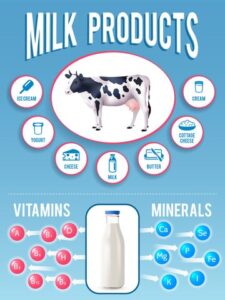Are you someone who believes that raw milk benefits health? Many people think drinking unpasteurised milk offers natural benefits. Many claim it’s packed with nutrients and helps boost immunity. But have you ever considered the risks?
Drinking raw milk might seem like a healthy habit, but it comes with hidden dangers. Despite the ongoing debate, experts warn about harmful bacteria in unpasteurised milk. Some still promote it as a superfood, ignoring the health risks. In this article, we’ll explore the raw milk benefit and whether it truly supports your health—or if it’s doing more harm than good. Stay with us as we uncover the truth!
Are there any Raw Milk Benefits? (Raw vs. Pasteurised)

Is it really a raw milk benefit, or are you risking your health? The truth is raw milk can carry some harmful microorganisms and viruses like Salmonella, E. coli, and Listeria that can cause some serious health issues, including food-borne illness. People who consume raw milk have a high risk of infectious diseases with no benefits. So, drinking raw milk can be dangerous for people with weak immune systems, like young children, elders, and pregnant women.
Even a single glass of contaminated raw milk can have serious consequences. And the worst part? The risks far outweigh any supposed benefits. Let’s take a look at some shocking statistics.
The Shocking Truth: Raw Milk and Dangerous Statistics
Think raw milk is safe because it comes from a healthy cow? Research says otherwise. NIH Research on Raw Milk states that:
- One-third of raw milk samples contain harmful bacteria—even when sourced from clinically healthy animals.
- Some believe that drinking raw milk prevents lactose intolerance and provides beneficial bacteria, but science says these are just myths.
- Up to 13% of raw milk samples tested positive for deadly bacteria like Campylobacter jejuni and Listeria monocytogenes.
- It has a shorter shelf life, making it more likely to spoil quickly.
One of the most alarming facts comes from the Centre for Food Security and Public Health. It reports that bovine tuberculosis can infect humans, and the most common way people get it is by drinking unpasteurised milk or eating dairy products made from raw milk.
With statistics like these, it’s clear that the risks of raw milk are real. But despite these dangers, many still argue for its health benefits. So, let’s explore whether there’s any truth to these claims.
Read Also: Probiotics vs Prebiotics Benefits: Know the Difference Before It’s Too Late
The Other Side: Are There Any Raw Milk Benefits?
While raw milk carries serious risks, some argue it has unique benefits. Let’s break them down:
- Higher Nutrient Content – Raw milk contains natural vitamins, minerals, and amino acids that may degrade during pasteurisation.
- Live Enzymes & Probiotics – It has active enzymes and beneficial bacteria that help digestion, which pasteurisation can reduce.
- Supports Immune Health – Some believe raw milk helps build a stronger immune system due to the presence of natural bacteria.
- All-Natural & Unprocessed – Raw milk comes straight from the farm without chemical treatments or processing.
So, is raw milk worth the risk? Well, as you have seen the science suggests otherwise.
Pasteurised Milk for a Stronger Immune System: A Healthy Tomorrow
Have you ever wondered why pasteurised milk is the safer choice? It’s because of pasteurisation, a process that heats milk to a specific temperature to kill harmful bacteria. This simple but powerful technique, pasteurisation has been protecting people from dangerous milk-borne illnesses since the early 1900s.
Diseases like brucellosis, listeriosis, and salmonellosis were once common due to contaminated milk. Thanks to pasteurisation, these illnesses have significantly decreased. If you want to enjoy milk’s nutritional benefits without the health risks, choosing pasteurised dairy products is the way to go.
“Pasteurising milk is one of the great public health achievements of the 20th century,” Nestle says. “Drinking cow’s milk used to kill babies.”
But does pasteurisation affect milk’s nutrition? Let’s find out.
Nutritional Benefits of Pasteurised Milk
Many believe pasteurisation removes essential nutrients from milk, but science says otherwise. Studies confirm that pasteurised milk retains its key vitamins and minerals, making it just as nutritious as raw milk, without the harmful bacteria.
Pasteurised milk contains:
- Vitamin A – Supports eye health and boosts immunity.
- Vitamin D – Helps in calcium absorption and strengthens bones.
- Vitamin B12 – Essential for brain function and red blood cell production.
While some argue that raw milk’s benefit is its natural state, research shows that pasteurisation has minimal impact on milk’s overall nutritional value. In fact, it enhances safety without compromising quality.
Milk isn’t the only food that benefits from pasteurisation. Many other dairy products, including cheese and yoghurt, undergo this process to ensure safety while preserving nutrients. When it comes to quality and safety, experts agree that pasteurised milk is the better choice.
Drinking pasteurised milk is particularly important for:
- Children under 5 years
- Pregnant women
- The elderly
- People with a weak immune system
So, the next time you reach for a glass of milk, make sure it’s pasteurised. Your body will thank you!
Read Also: Best Foods for Gut Health: Must-Have Superfoods for a Happy Gut
Busted: Top 5 Myths About Raw Milk Benefits
Raw milk carries hidden dangers that many ignore. While some claim raw milk boosts immunity and improves digestion, research from the FDA and CDC proves otherwise. Let’s bust the top five myths and separate fact from fiction!
Claim 1: Pasteurisation Destroys All the Healthy Nutrients in Milk
Myth: Advocates of raw milk argue that pasteurisation strips milk of its essential nutrients, making it less beneficial.
Truth: A study published by NIH confirms that pasteurisation has minimal impact on milk’s nutritional value. Most vitamins in milk naturally exist in low levels, so any reduction is insignificant. However, milk remains a rich source of vitamin B2, which pasteurisation helps preserve while eliminating harmful pathogens. This makes pasteurised milk both nutrient-dense and safer to drink.
Claim 2: People have been Consuming Raw Milk for Decades Without any Problem
Myth: People in favour of raw milk still wonder if raw milk is unsafe to consume; then why did our ancestors use it? So, making them believe that it is safe to drink raw milk.
Truth: This belief of people shows a lack of awareness about the historical dangers of infectious diseases transmitted by raw milk for centuries. Significantly, raw milk has caused several deaths of infants throughout history. In developed countries, the consumption of pasteurised dairy products has been directly related to reduced infant mortality. From India to Africa, people boil raw milk routinely before feeding it to babies, children, and other family members to protect them from dangerous milk-borne diseases.
Claim 3: Raw Milk is Healthier than Pasteurised Milk for Babies
Myth: Raw milk promoters in developed countries continue to believe that raw milk is healthier than pasteurised milk for newbies.
Truth: Studies have shown that human breast milk is a rich source of nutrition, hence making it the safest and healthiest option for newborn babies. Authors and healthcare professionals also advise that when breastfeeding is not an option, parents should give only pasteurised animal milk to their infants and young children.
Claim 4: Raw milk Produced from Hygienic Animals does not Carry Pathogens
Myth: Raw milk supporters believe that unprocessed raw milk that comes from hygienic animals does not carry pathogens.
Truth: Experiments have shown survival and even growth of E. coli O157 in raw milk and unpasteurised dairy products.
Check Out Unpasteurised Milk Products PDF.
Living bacterial pathogens that are dangerous to health are found in huge amounts in the milk tank. Hence, studies prove that the “good” bacteria, enzymes, and other components of raw milk do not kill “bad” or deadly bacteria of raw milk, no matter how healthy or hygienic the animals are.
Claim 5: Raw Milk Cures Milk Allergies, Asthma, and Digestion Problems
Myth: Natural food promoters believe that raw milk is a great remedy to cure diseases like allergies, asthma, and digestion problems.
Truth: NIH research states that drinking raw cow milk reduces childhood allergies. However, the authors of the research have yet to provide evidence. So, it is unclear whether farm (raw) milk works as a remedy to cure milk allergies, asthma, etc. The European researchers even recommend that other farm factors, such as being around animals and barns, can affect the development of allergies in children.
Find out more about other myths related to raw milk benefits here:
Related: How to Start a Plant-Based Diet: A Step-by-Step Guide for Indian People
Conclusion
You can control what you eat and drink. Drinking milk and consuming dairy products are the best ways to get calcium and vitamin D in abundance. However, these benefits are present in pasteurised milk. Though the raw milk benefits cannot be ignored, the claim still needs to be evident on a scientific basis.
After reading this post, you can educate yourself on whether your health supports the consumption of raw milk consumption or if it is slowly taking you towards dangerous diseases. Food-borne diseases can be prevented with simple steps of processing and handling—including pasteurisation, which preserves all the important nutrients and reduces the risk of dangerous diseases.
FAQs
Q-1: Is it good to drink raw milk daily?
Raw milk can contain harmful pathogens that can cause dangerous diseases to you and your loved ones consuming raw milk.
Q-2: Does raw milk have any side effects?
New York State Department of Health states that some people who drink raw milk have developed dangerous diseases, including paralysis, kidney failure, and stroke.
Q-3: Which milk is better, raw, or boiled?
Though milk needs boiling to get rid of harmful bacteria, it is not applicable to pasteurised raw milk. People must remember that packaged milk like Amul has already undergone the process of pasteurisation.
Q-4: What does Ayurveda say about raw milk?
As per Ayurveda, it is advisable to choose organic milk that does not contain hormones that farm owners feed to cows to increase milk production. Ayurveda advises that the raw milk taken should be boiled for at least 4-5 minutes.
Q-5: How common is TB from raw milk?
It is estimated that about 10-15% of people who have a long-term habit of drinking raw milk get TB.
Q-6: How to safely consume raw milk?
If you want to add raw milk to your routine, first consult with your physician; if they advise, then it is good to start with one-fourth cup, slowly increasing the quantity.
About The Author
Hi, I’m Manjula! I’m all about turning ideas into words that resonate. Whether it’s exploring the latest in tech, diving into AI, or having honest conversations about mental health, I’m here to write stories that matter.
I’m a firm believer that good content should be as engaging as a chat over coffee—so that’s how I write. When I’m not typing away, you’ll find me sharing thoughts and connecting with awesome people on LinkedIn, or capturing life’s little moments on Instagram. Drop by and say hi—I love a good conversation!








